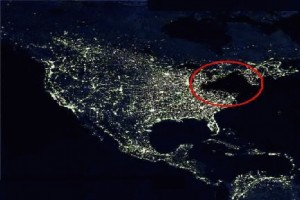 Another day, another power outage, courtesy of National Grid.
Another day, another power outage, courtesy of National Grid.
Tonight, we lost power again. While we were out for only about an hour, the astonishingly unreliable National Grid distribution system has me thinking.
First, National Grid should be heavily fined and their management replaced. Tonight, when I called “customer service” to report our outage (it takes real effort to talk to a human — they’d rather not actually speak to customers), I got an earful of how heroic their response has been. Well, that may be the conventional wisdom inside that company. But here, in the real world, the consensus of everyone I talk with is that National Grid should be tarred, feathered and run out of town in one of their bucket trucks. National Grid is patting itself on its collective back while people continue to suffer and their repairs don’t hold. (It’s an interesting marketing problem — but that’s a topic for a different blog post.)
Second, the fury of the people — some 85K of whom are still lights out in the sixth day of this event — has reached our politicians. Governor Patrick has called for an investigation. Senator Brown has written a letter expressing the outrage of the common man. As National Grid owns the DPU (see regulatory capture), the former will accomplish nothing to improve National Grid’s mismanagement. And Senator Brown is burnishing his lunch-bucket, regular dude populist credentials in an effort to get ahead of the real populism of his apparent re-election challenger, Democrat Elizabeth Warren. A pox on all these politicos’ heads for their cynical (and ultimately ineffective) manipulation of these events for their own political objectives.
Third, I am reminded of the first time I went to India on business. It was 1995; I was working at Lotus Development. We were there to deliver a symposium for Notes application developers. I was just beginning the heavy international travel for business that dominated my career in the 1990s. I was naïve. In those early trips, I assumed that the world was like home: you could drink the water wherever you went and nobody ever thought about electricity supplies.
I remember visiting a Notes reseller on my first full day in Delhi, accompanied by our country marketing manager. We sat with the reseller’s managing director at the end of a long hall. Running down the spine of this hall snaked more than a dozen folding tables placed next to each other on their short sides like you might see set up for an event . On each side of the table were employees, working furiously on a variety of terminals — DEC VT101 compatibles, IBM 3270 compatibles and generic TTYs (all antiques today). This was the beginning of out-sourcing. I was told these people were doing contract programming for companies in the US.
All of a sudden, the power stopped. Nobody looked up. The fans stopped, the humming of the terminals stopped. It was silent. The programmers sat with their fingers curled at the ready over the keyboards of their terminals, eyes staring straight ahead at blank, dark terminal screens. Each programmer was in his or her own world, trying to remember where they were in the logic they were programming. They were at the ready, waiting for the power to come up in a few minutes — for just a couple of minutes. It was as if they, too, had been stopped dead by the power outage.
At our table, nobody missed a beat — except for me, the provincial dork. “Why,” I asked, “is everyone staring straight ahead, waiting to pounce on the keyboards? In a US office, when this happens, people push from their desk, laugh, talk sports and gossip until the power comes back on.”
“Not to worry,” I was told. “They are mentally paused at the last set of programming instructions just before they lost power and saved the items they were working on. They won’t remember as much if they relax and start talking. Plus, this happens several times a day. They’re used to it.”
And so it did happen, twice more in my hour meeting. I left astonished at the adaptation these programmers had to develop to keep their train of thought going during repeated, random power outages. They adapted by putting them minds into pause when power went out as a way of preventing re-work. It was my first taste of what happens to people who have to rely on third-world infrastructure.
Tonight, it’s a metaphor for what National Grid is doing to Southborough: they are pulling us backwards into the third-world, where we will all have to adapt, somehow, to an increasingly unreliable electricity supply. And that adaptation can only mean a step backwards for our living standards.
So, no, Governor Patrick, calling for an investigation won’t help. And, Senator Brown, you can save your franking privileges; it’s not going to do any good and it’s an utterly transparent political maneuver.
Instead, how about making DPU accountable for the third-world condition of our grid? Why not replace management there with new blood, people who have been explicitly charged with making sure National Grid is accountable for its failures? Why not put some teeth into this regulator to make sure that, one day, Southborough can once again rejoin the first world?
Leave a Reply